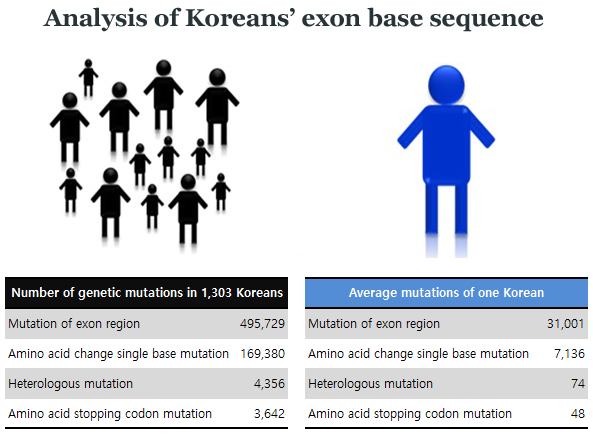A research team has analyzed Koreans’ protein marker base sequence, which can serve as the basis for racial characteristics of Koreans and the cause of their diseases.
Two research teams, each led by Professors Kwak Soo-heon and Park Kyung-soo박경수 of Seoul National University Hospital (SNUH)서울대병원 and Professor Kim Jong-il김종일 of Seoul National University College of Medicine서울의대, analyzed the base sequencing in the entire exonic areas of 1,303 Koreans to find gene mutations unique to Koreans, including analyzing gene mutations that could be diagnosed and treated early.
The study was the largest scale of its kind, and its results were published online in the July issue of the journal Experimental and Molecular Medicine, according to a press release issued by SNUH.
Genetic mutation characteristics are likely to contribute to the investigation of various racial characteristics and disease mechanism as well as to search for the cause of illness in clinical practice, it said.
The human genome is composed of 3 billion base pairs, and most of them are the same, but the differences in the base sequence determine race, individual difference, and disease. Among them, the gene exon encoding the protein-like product in DNA is less than 1 percent of the entire gene sequence, but this region’s mutation is significant because it can change the structure and function of the protein.

The joint team analyzed the entire exon sequences of 1,303 people and looked at about 495,000 gene mutations. Out of this, 169,000 were single base mutations causing amino acid changes, and 4,300 were frame shifts. Also, 76,000 mutations were the first genetic mutations found in Koreans.
Individuals had a single base mutation that caused 7,136 amino acid changes per person and had 74 frame shifts.
The examination of 56 gene mutations which enables the diagnosis and treatment of various diseases -- such as ovarian cancer, hereditary breast cancer, familial hyperlipidemia, hereditary arrhythmia, and cardiomyopathy -- revealed that 2.46 percent of ordinary Koreans have unexposed genetic mutations.
They have also developed a variety of validation methods for applying and interpreting this genetic information in clinical practice.
Recently, a variety of dielectric analysis techniques has been introduced to realize precision medical care. Precise genomic information of the general population of Koreans is essential for correct interpretation of results, the press release said.
"This study will contribute to the realization of precision medical care by providing precise analysis results of the whole exon sequence in Korea,” Professor Kwak said.

